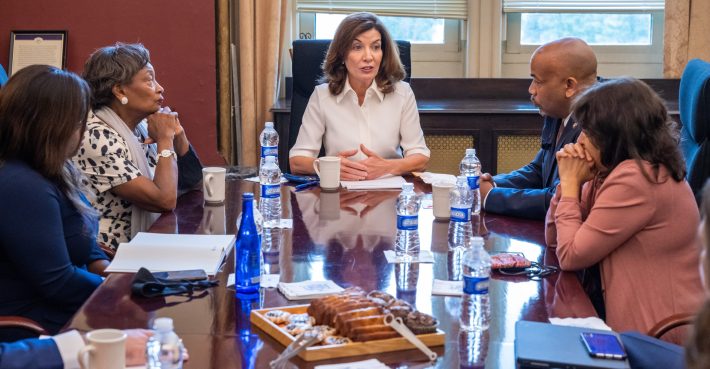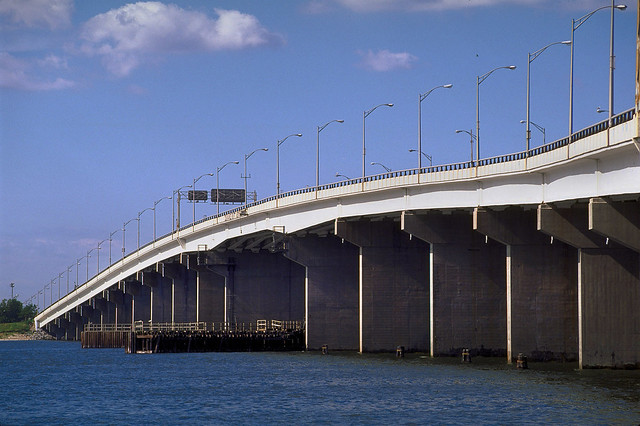Gov. Hochul and state legislators in Albany are spending millions of dollars from a congestion pricing-adjacent fund on toll rebates for drivers while showing zero interest in actual bus or rail ideas, transit advocates charged.
In a missive to Hochul, Senate Majority Leader Andrea Stewart-Cousins and Assembly Speaker Carl Heastie, advocates demanded the trio leaders stop squandering the money in the Outer Borough Transit Account — a special fund meant to provide discounts or increased transit service outside of Manhattan – on toll rebates that encourage more driving.
"We are disappointed to learn OBTA funds are being used mainly for toll rebates, not to improve transit service," 16 organizations including Reinvent Albany, Brooklyn Center for Independence of the Disabled, Riders Alliance and the Permanent Citizens Advisory Committee to the MTA wrote.
"You have an opportunity to expand upon the increases in subway service made in last year’s budget by providing targeted bus improvements and discounts for in-city commuter railroad trips with OBTA funds," the letter said.
"This is particularly important as congestion pricing is slated to start this summer; other successful roll-outs of congestion pricing such as in London were complemented by increases in bus service."
State officials created the OBTA in 2018 from a surcharge on taxi and for-hire vehicle trips in Manhattan that was pitched as "Phase One" of the congestion pricing rollout.
The first $300 million raised each year by the surcharge, which was delayed by a lawsuit and then wrecked by a deep drop in Manhattan cab rides during the pandemic, funds subway maintenance work in Subway Action Plan. The next $50 million raised each year is earmarked for the OBTA, which legislators and the governor must agree on how to allocate each year.

The surcharge finally raised enough money to fund the account in 2022 and 2023, giving Albany tens of millions of dollars for items such as expanded transit service or cheaper fares — the exact type of "carrots" pols said they wanted to accompany the "stick" of congestion pricing.
But as of now, most of the money legislators have agreed to spend is for toll rebates for Bronx residents who drive over the Henry Hudson Bridge and Queens residents who drive over the Cross Bay Bridge and Staten Island residents who drive over the Verrazzano Bridge — a cost of $22.2 million.
The one transit improvement funded by the OBTA so far is the Far Rockaway City Ticket, which created a $7 peak and $5 off-peak tickets for people taking the Long Island Rail Road from Far Rockaway station to other stops in the city.
Legislators had other ideas for what to do with the fund back in 2020, including discounted intracity LIRR and Metro-North single ride and monthly tickets. But the MTA made that idea moot by expanding the City Ticket citywide last year. The discount ride, which was a $5 ticket only available for off-peak commuter rail intracity travel now has a $7 peak option and a $5 off-peak option for people taking the LIRR or Metro-North inside city limits.
With those possibilities off the table, legislators appear to be at a loss for how to help their constituents, besides a cynical grandstanding lawsuit to stop congestion pricing.
Officials always intended for the OBTA to fund toll rebates, but it also needs to fund improvements in public transit, advocates said.
"The congestion pricing law included local toll relief from the start — but the Outer Borough Transit Account should clearly also help the millions of people outside Manhattan who don't have cars and who depend on public transit to get around, especially in neighborhoods with commuter train stations but no subways," said Riders Alliance Director of Policy and Communication Danny Pearlstein.
"On the Henry Hudson Bridge, where toll shopping to two nearby free bridges causes serious congestion and pollution in the environmental justice communities of northern Manhattan and the northwest Bronx, exempting Bronxites from the toll should be the start of a conversation that includes support for more and better public transit options."
Representatives for Hochul, Stewart-Cousins and Heastie did not respond to a request for comment.






